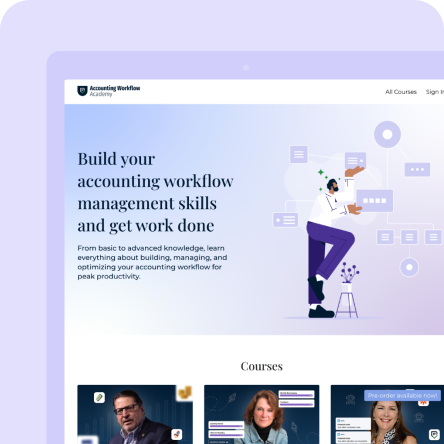Now might be a good time if you’re thinking of ditching your 9-5 to start an accounting firm.
An analysis projects the global accounting and auditing market to reach $379.05 billion by 2032. Plus, according to our 2024 firm revenue report, firm owners earned an average of $623,296 in 2023, highlighting the industry’s profitability.
When you add that to a flexible work schedule and the freedom to build a client base that aligns with your values, the switch is worth considering.
However, starting an accounting firm comes with some challenges. According to an Accounting Today survey, 51% of firms cited keeping up with regulatory changes as their biggest headache. Other common issues include recruiting and retaining good employees, acquiring clients, and keeping up with the economy.
But all these shouldn’t deter you. Following the strategies we provide in this guide, you can start and grow a successful accounting firm.
Starting an Accounting Firm: A Step-by-Step Guide
Here are the ten steps to follow to launch your accounting practice successfully.
Step 1: Assess Your Readiness and Skills
It’s normal to hear that little voice of doubt questioning whether you’re ready. But “if you’re thinking about it, you just have to start,” says Jason Staats, CPA
However, starting a firm requires more than just technical accounting knowledge and experience.
You’ll also need to develop other essential skills, with leadership being one of the most critical. “Leadership is actually the main issue that holds firms back from scaling beyond certain thresholds,” says Brandon Hall, CPA. The reason is simple: effective leaders drive team performance, shape company culture, and maintain smooth operations.
Other skills to possess include:
- Client relationship
- Time management
- Presentation
- Listening
- Collaboration and communication
If you don’t want to provide all of these services or possess these skills, you can still be a great resource for your customers needing services you don’t provide. Find someone who loves to do the kind of work you may not love to do, and they can be an extension of your team.
Additionally, we recommend you stay up-to-date with industry best practices, monitor the latest trends, leverage accounting technology, attend industry-specific conferences, and improve your knowledge with relevant accounting courses.
Still in the process of ideating your firm? Use our accounting firm name generator to get name ideas for your firm for free.
Step 2: Create a Detailed Plan
A solid business plan helps you to set clear goals, secure funding, allocate resources effectively, and outline your growth strategies. Without one, you risk wasting time and resources, potentially jeopardizing your firm’s success.
A typical business plan should include important elements such as:
- Service offerings
- Target market research and analysis
- Pricing structure
- Brand and marketing strategies
- Growth plans
- Financial projections
Read more:
Step 3: Choose Your Business Structure
Choosing the right legal structure would determine how your firm operates. Therefore, do your due diligence before choosing the one that suits your practice.
Here’s a breakdown of the common business structures for accounting firms:
- Sole Proprietorship: This structure is simple, cost-effective, and ideal for solo practitioners. While you have full control over your firm, you’re also responsible for its debts and liabilities, which may put your assets at risk.
- Partnerships: Two or more people who share ownership, responsibilities, profits, and losses. They report deductions on individual tax returns and are personally liable for each other’s business debts.
- C corporation: This business structure provides liability protection. However, it’s subject to double taxation, meaning the IRS taxes corporate income at the business level and tax dividends again at the individual level. It is suitable for large firms.
- S corporation: Unlike a C corporation, an S corporation avoids double taxation by allowing profits to pass directly to shareholders’ tax returns while providing liability protection. It is great for small to medium-sized firms.
- Limited Liability Companies (LLP): Offers liability protection and flexible management. Also, the IRS taxes income only at the individual level. Ideal for small to medium-sized firms.
Pro tip: When choosing a business structure, consider factors like taxes, liabilities, scalability, and your long-term goals before making a decision. Also, consult legal or financial experts for advice.
Step 4: Obtain the Necessary Certifications and Licenses
There are certain certifications and licenses you may need to acquire before you can legally operate an accounting firm. Besides ensuring compliance, these credentials enhance your credibility, build client trust, and position you as an expert.
Some certifications and licenses to obtain include:
- Certified Public Accountant (CPA) License: This is required in most jurisdictions if you intend to provide auditing, financial advisory, or other specialized accounting services. It demonstrates your expertise and adherence to high ethical standards.
- Business Registration: Depending on your chosen legal structure (e.g., LLC, corporation), you must register your firm with the appropriate local or state authorities to comply with regulations and avoid penalties or fines.
- Professional Bodies: We recommend registering your firm with relevant bodies such as the American Institute of CPAs (AICPA) to build trust, enhance credibility, and ensure compliance with industry standards.
- Business Licenses: Some jurisdictions require a general business license to operate. Check with your city or local regulatory body to know the kind of licenses or permits you need.
- Specialized Certifications: Depending on your niche, you may need to acquire additional certifications like Certified Management Accountant (CMA), Accredited in Business Valuation (ABV), Enrolled Agent (EA), or Chartered Accountant (CA). This improves your skill set and helps you attract high-paying clients.
Step 5: Set Up Your Office and Technology Infrastructure
A physical office or virtual setup? This is one decision you’d have to make as a new firm owner.
A physical office helps establish a local presence, builds trust with businesses, and offers a dedicated workspace for employees. However, it comes with higher setup costs, including rent, utilities, equipment, and ongoing maintenance.
In contrast, a virtual office offers lower overhead costs, making it an ideal choice for solo practitioners with smaller budgets. The tradeoff is that communication with your employees may require extra effort and clients who prefer physical meetings may find it less comfortable.
Regardless of your decision, one non-negotiable aspect of setting up your firm is implementing accounting technology to streamline operations, improve accuracy, and meet deadlines. This includes:
- Accounting Software: To automate repetitive tasks such as invoicing, data entry, and bookkeeping.
- Secure Document Management: To safely organize, share, and store sensitive client files, receipts, and invoices.
- Workflow Management and Automation: To streamline workflows, automate recurring tasks, and set deadlines to boost productivity and improve accuracy.
- Client Portal: To get documents, reports, and responses from clients faster without chasing them.
- Billing Software: To automate invoicing, reminders, and payments.
- Collaboration and Communication Tools: To work efficiently with team members and clients.
A tool like Financial Cents bundles most of these features into one app. This eliminates the need to switch multiple apps, saving time and boosting productivity. The best part? We designed it to scale as your firm grows.
One thing to be mindful of when setting up your technology infrastructure is cyberattacks like malware, ransomware, and phishing, which cause data breaches, loss of trust, and a damaged reputation.
That’s why you must take cybersecurity and data protection very seriously. Protect sensitive information by updating software regularly, using antivirus programs, implementing multi-factor authentication (MFA), and backing up your data.
Step 6: Develop Your Service Offerings
You probably have expert knowledge and experience in various accounting areas, including:
- Tax Preparation Business
- Bookkeeping
- Auditing
- Consulting
- Accounting advisory services
This will make you more valuable when choosing the services to render. According to our Firm Revenue Report, accounting firms generated the highest revenue and profit margins from bookkeeping, tax returns, and advisory services in 2023. As such, focusing on these areas could be beneficial when developing your service offerings.
However, you should note that many generalist accounting firms offer similar services. So, how do you stand out in a highly competitive market?
That’s where niching—specializing in a particular industry or service type—comes into play. This approach differentiates your firm and enables you to attract potential clients looking for specialized services. Zane Stevens, CA, shares a similar view:
One of the benefits of having a niche is you know who you are looking for and if you are looking for, it makes the business of ‘who do I talk to’ a little bit easier."
Take The Profit Constructors LLC, for example. They specialize in providing accounting services to construction companies. As such, companies in this category are more likely to engage their services because they’ll perceive them as experts compared to a firm that serves a broader range of industries or a different industry.
When starting an accounting firm, you may not know the niche to specialize in, and that’s okay. “You do not have to figure out your niche on Day 1. You might have an idea of what your niche is, but you don’t have to run head first into this,” says Zan Stevens, CA. “You will be fine if you try a few things on the way there.”
At the start, take on projects with clients in different industries, and as time goes by, you’ll be able to identify the niche that is profitable, works best with your skills, and aligns with your long-term goals.
Step 7: Start Building an Online Presence and Marketing Strategy
You need a strong online presence and a good marketing plan to attract clients.
Here are some tips for creating one:
- Identify your Ideal Clients: To market your firm effectively, you must know your ideal clients, i.e., their industry, demography, location, goals, and challenges. This enables you to focus your marketing resources on the right people and ensures your content resonates with their needs.
- Create a Professional Website: Your website acts as your digital storefront, allowing potential clients to discover your firm, learn about your services, and take action. While you don’t have to build one right away, it’s a valuable asset for establishing credibility and attracting potential clients.
- Leverage Social Media: Platforms such as Facebook, Instagram, and LinkedIn help you build brand awareness, expand your reach, and get clients for your firm.
- Share Valuable Content: People buy from people they know, like, and trust, and sharing relevant, helpful content is one way to build such relationships. Amanda C Watts corroborates this point,
Without creating value through content, your ideal clients will always compare you (on price) with the accountant down the road, and they will choose them over you because they are cheaper."
- Invest in Paid Ads: Run ads on Google and social media (Facebook, Instagram, X, LinkedIn) to reach a wider audience.
Digital marketing may be the major client acquisition channel but offline marketing still works. Tactics like cold emails, networking events, and referrals are great ways to find and land clients for your practice.
Step 8: Acquire and Manage Clients
You need a solid client acquisition strategy to generate consistent leads. Your strategy can consist of the following:
- Networking Events: Attend networking events, industry conferences, or seminars to connect with potential clients, share knowledge, and build relationships.
- Partnerships: Collaborate with complementary businesses like law firms, financial advisors, or real estate agents. They can refer clients who need accounting services.
- Offer Free Consultations: Prospective clients may hesitate to commit since they don’t know what to expect. A free consultation is a great way to establish rapport, showcase expertise, gain trust, and provide value upfront.
- Leverage Referrals: Remember, word-of-mouth marketing is powerful. Providing quality services increases your chances of getting referrals from satisfied clients.
Manage clients and maintain long-term relationships with them by:
- Making the onboarding process as seamless as possible. Provide new clients with a simple overview of your services, billing structure, and how you work. You can use a client portal to keep everything organized.
- Being transparent with your pricing structure and discussing your fees upfront, what’s included in each service, and any extra costs that may arise.
- Setting clear expectations for deliverables timeline and schedule.
- Communicating regularly with clients and sharing personalized updates with them.
- Providing excellent customer service to keep them satisfied and loyal.
Step 10: Plan for Growth
Running a solo practice may seem easy at first, but it can quickly get overwhelming when you have more clients and workload. This can stall growth, but to scale your firm, consider:
- Recruiting skilled accounting professionals to maintain work quality and efficiency. “A great team is going to increase the value of your business and help you scale,” says Ryan Lazanis CPA.
- Leveraging emerging accounting technologies like automation, artificial intelligence, and cloud computing to streamline workflows, increase productivity, and grow your firm.
- Expand your service offerings to attract more clients, and increase revenue.
- Monitoring key performance indicators (KPIs) like working capital and operating cash flow. Use these insights to gauge performance, identify growth opportunities, and make informed business decisions.
Scale Your Firm with Financial Cents
Starting an accounting firm is no easy task, but it’s one that can be financially and career-fulfilling if you do it right. The process we’ve outlined here will help you avoid a lot of the mistakes that new firm owners make.
You also don’t need to wait till you have tens and hundreds of clients before using practice management software like Financial Cents. You can start leveraging it right from the start, and as your firm grows and scales, it’s right there beside you.
Manage your firm profitably with Financial Cents.







